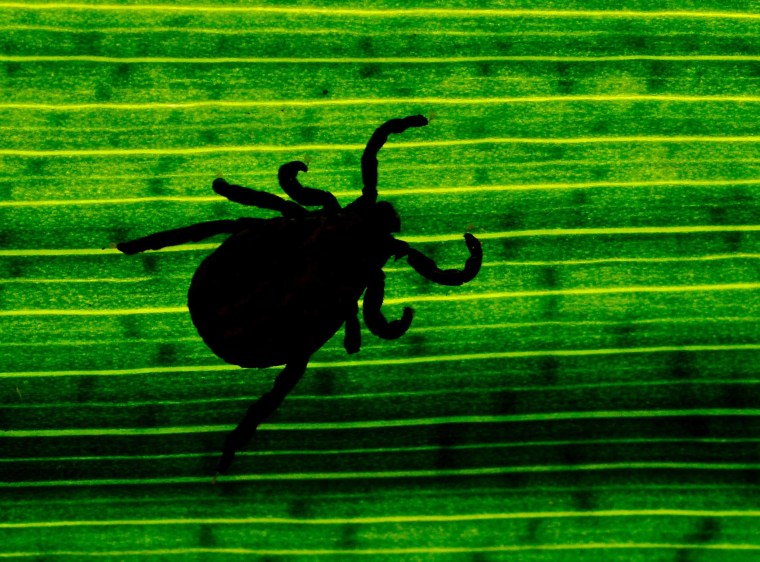Researchers working to develop a way to prevent Lyme disease say they’ve had promising results with an unusual approach that stimulates the immune system to ward off infection.
They’ve developed a lab-engineered antibody that they say could protect against Lyme for a whole season. Tests in mice show it completely protects them against the Borrelia bacteria that cause the disease, the team told a meeting in San Diego of infectious disease experts.
It’s called a monoclonal antibody and is not a vaccine, but an approach that builds on the gamma globulin shots that were once frequently used to try to prevent tuberculosis and hepatitis, says Dr. Mark Klempner of the University of Massachusetts’ nonprofit vaccine development arm, MassBiologics.
"This is not a vaccine and has many advantages over a vaccine," Klempner told NBC News. "The way a vaccine works is that you give people pieces of the bacteria or the virus that you are interested in preventing and then the body mounts a big immune response."
“This is not a vaccine and has many advantages over a vaccine."
This immune response usually involves the creation of antibodies — the immune system proteins that recognize and target invaders — as well as immune system cells such as T-cells. If a vaccine is a powerful one, this immune response can last for years.
The MassBiologics antibody is far more precise. It would introduce a dose of a single antibody that would specifically target Lyme-causing bacteria.
"With the monoclonal antibody strategy, you are immune immediately," Klempner said. "As soon as you take the shot, you have the highest level of immunity."
The disadvantage: People at risk of Lyme disease would need to get a fresh shot every year, much like people must get a new flu vaccine every year.
They used genetically engineered mice that have some human immune system genes. They immunized the mice using the Borrelia bacteria that ticks pass to people in a bite and that can cause Lyme. Then they harvested the antibodies that the mice produced.
"We identified four that were very, very potent against multiple strains of the Lyme disease-causing bacteria, both here and in Europe," Klempner said.
When they tested the antibodies in different mice, a single injection protected them from a big dose of Borrelia. Even when several infected ticks bit the mice, none became infected.
The approach may be more acceptable to many people than a vaccine, Klempner said. There once was a human Lyme disease vaccine on the market, but its maker, GlaxoSmithKline, stopped making it after rumors about its safety and multiple lawsuits filed by people claiming it made them sick. The company said it couldn’t sell enough doses to make it worthwhile.
"You are immune immediately."
A commercial company, U.S. Biologic, is working on a vaccine that would target the mice that help spread Lyme disease. They plan to produce it in pellets that resemble pet food kibble.
But right now, people have few options to protect themselves besides long sleeves, socks and bug spray.
The Centers for Disease Control and Prevention estimates that 300,000 people are infected with Lyme every year.
The infection is gradually spreading from the Northeast and becoming more common farther south and east, and Lyme is now found in four times as many counties now as it was in 1993.
Klempner says the company is laying the groundwork now to start testing its monoclonal antibody in people next year.
Monoclonal antibody drugs are used to treat a range of disease, including cancer. They are often very expensive, costing upwards of $100,000 a year. Klempner said the university's goal is to make it available cheaply.

